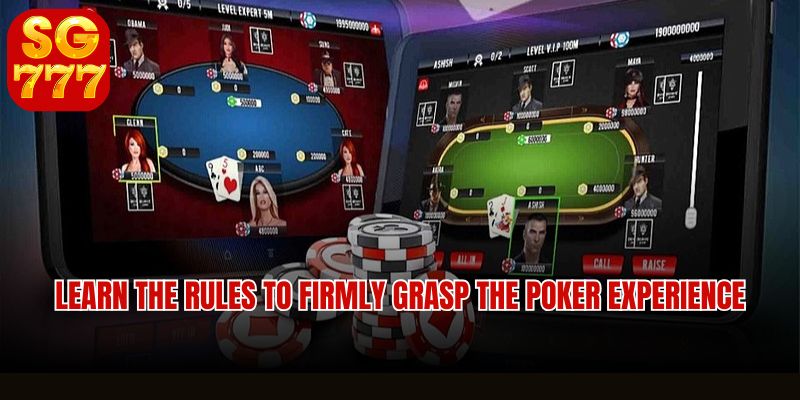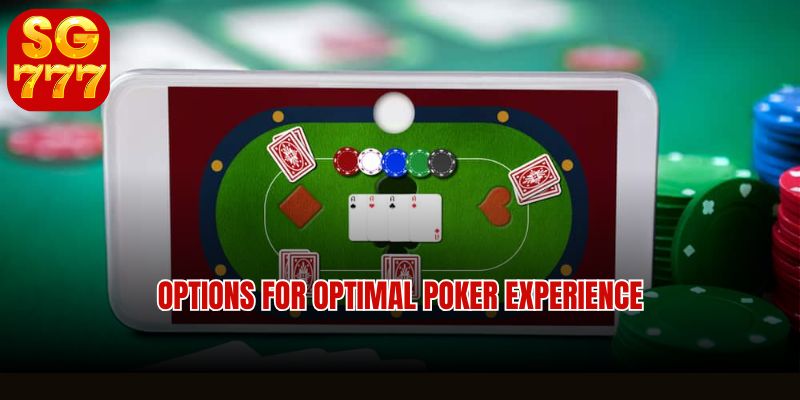Poker experience is more than just a game—it’s a strategic art form that blends skill, intuition, and psychology. In this article, SG777 will guide you through everything you need to know about poker, including the basic rules of 7-card poker, types of bets, hand rankings, and expert strategies from seasoned players to improve your gameplay.
Basic Rules of 7 Card Poker
Before immersing yourself in the full Poker experience, it’s crucial to grasp the basic rules. This foundation helps players understand the game’s flow and apply strategies with confidence and precision.
Game Concept
Poker is a popular casino card game where each player aims to form the best hand from a standard 52-card deck. In 7 Card Poker, each player receives seven cards. Players then evaluate their hands and decide whether to fold or place a bet to stay in the game.
The ultimate goal of any Poker experience is to hold a hand stronger than your opponents’. The tension lies in knowing when to fold and when to bet aggressively.
Card Dealing Process
At the beginning of each round, players are dealt seven cards face-down. These cards remain private until the end of the game. The dealer deals clockwise, starting with the player to their left. In multiplayer games, fairness in card distribution is key, and the dealer must ensure each player receives the exact number of cards.
Betting Rules
Once the cards are dealt, the betting phase begins. In 7 Card Poker, players usually place an initial ante or blind bet. If a player’s hand looks weak, they can fold and exit the round. However, if confident, they may raise their bet to challenge others or bluff.

Classification of Card Hands in 7-Card Poker
To master the Poker experience, players must understand how card hands are ranked. Recognizing the value of your hand helps you make smart betting decisions and anticipate your opponents’ moves.
Basic Hand Rankings
In 7 Card Poker, hands are ranked from strongest to weakest. Below are the most common winning combinations every poker player should memorize:
- Four of a Kind: Four cards of the same rank. One of the most powerful hands.
- Full House: Three of a kind combined with a pair.
- Flush: Five cards of the same suit, not in sequence.
- Straight: Five consecutive cards of mixed suits.
Knowing these combinations gives you the upper hand when deciding whether to bet or fold during the game. Strong hands like these often guarantee a higher chance of success at SG777 Casino.
Individual Card Values
Beyond the hand combinations, each card holds a value that contributes to your total hand strength in the Poker experience. Here’s how card values are typically assessed:
- Ace: Usually the highest card, valuable in both low and high hands.
- Cards 2–10: Valued at their face number.
- Face Cards (J, Q, K): Ranked higher than numbered cards but lower than Aces.
Understanding the hierarchy of hands and card values empowers you to calculate probabilities and control the game tempo, especially in high-stakes rooms like those at SG777 Sportbooks.

Share Poker Experience from Experts
To elevate your Poker experience, learning from seasoned players is key. Professional strategies and insights not only sharpen your skills but also improve your odds of winning consistently.
Read Your Opponents
A critical part of successful poker play is being able to read your opponents. Watch their reactions, betting patterns, and hesitation levels to predict the strength of their hand. For example:
- Large bets early on often signal a strong hand.
- Quick folds or small bets may indicate uncertainty or weak cards.
Mastering this technique gives you a psychological edge in any table—especially when participating in live tables like those in SG777 Live Casino.
Manage Your Bankroll Wisely
Smart money management is essential in the Poker experience. Set a clear limit for how much you’re willing to bet, and never chase losses. Discipline in budgeting keeps your emotions in check and allows for a more strategic gameplay over the long term.
Use Advanced Betting Tactics
Winning in poker isn’t just about the cards; it’s about how you bet. Two classic techniques include:
- Slow Play: Underbetting with a strong hand to lure opponents into overcommitting.
- Bluffing: Betting big with a weak hand to pressure opponents into folding.
Apply these moves selectively to maintain unpredictability and maximize your strategic advantage.
Maintain Mental Focus
The mental side of the Poker experience can’t be overstated. Frustration and impulsivity lead to costly mistakes. Take breaks, breathe, and regroup if necessary. A calm and focused mind makes sharper decisions and adapts better to changing game dynamics.

We hope this comprehensive guide has enriched your understanding of the Poker experience. Whether you’re a newcomer or a seasoned player, these strategies—from learning hand values to mastering betting tactics—will support your journey toward becoming a confident, winning player.
Try Your Poker Experience Today at SG777
Now that you’re equipped with the rules, strategies, and professional tips, why not test your skills in a real environment? SG777 Card Games section offers immersive and fair poker rooms where you can put your knowledge to use—anytime, anywhere.
Still have questions? Visit our FAQs section for quick answers to commonly asked poker and platform-related topics.
Good luck—and may every hand bring you closer to the jackpot!

